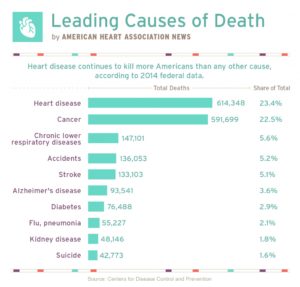Bless Your Heart, Teacher – Tips to Improve your Heart Health
It should come a no surprise that there is a strong connection between a nutritious diet and a healthy heart. A recent University of Washington study found that nearly 50% of deaths from cardiovascular disease could have been prevented by making adjustments to the way you eat and the choices you make in life. Cardiovascular disease continues to be a leading cause of death for Americans and even globally. Below are listed the most significant dietary changes a person can make that will have a greater impact on their heart healthiness.

- Eat more vegetables (aim for 7-10/daily). Studies have shown that while 7 servings will provide protection against CVD, eating 10 servings or more each day reduces your risk by a whopping 24%!
- Go nuts. The second most effective step you can take is eating more nuts and seeds. This change alone can reduce the risk of CVD death by 11.6%.
- Choose whole grains (whole-grain bread, oatmeal, and brown rice). They have more protein and fiber than refined grains. Because whole grains are more filling, you may feel satisfied with fewer calories.
- Limit salt. Excess sodium increases blood pressure, and the symptoms are often invisible. Substitute lemon, garlic, and other flavorful herbs and spices.
- Eliminate trans-fatty acids. Trans-fats raise unhealthy LDL cholesterol and lower healthy HDL cholesterol. You can avoid them by eating fewer processed foods, especially those that list partially hydrogenated oils in their ingredients.
MORE HEALTHY HABITS FOR A HEALTHIER HEART
- Try a Mediterranean diet. This diet consists of mostly plant-based foods, along with fish and moderate amounts of red wine. Following a Mediterranean diet guarantees heart-healthy choices.

- Increase omega-3s. Consider adding at least 2 servings of fish a week to your diet, especially fatty types like salmon and tuna. If you’re a vegetarian, rely on flax seeds, walnuts, and beans for your omega-3 fatty acids.
- Quit smoking. Talk with your doctor if you’re having trouble giving up tobacco on your own. Your physician can help you understand your options, including nicotine-replacement devices and support programs.
- Use alcohol in moderation. Small quantities of alcohol may actually be good for your heart. That means up to 2 cocktails a day for men and one for women.
- Exercise regularly. Physical activity makes your muscles stronger, and that includes your heart.
 Enjoy aerobic exercise, stretching, and resistance training. Design workouts that you love and will want to stick with. Likewise, limiting TV watching to 2 hours or less and in favor of exercise.
Enjoy aerobic exercise, stretching, and resistance training. Design workouts that you love and will want to stick with. Likewise, limiting TV watching to 2 hours or less and in favor of exercise. - Lose weight. Being overweight puts an extra strain on your heart, especially if those excess pounds are mostly around your waist. Slim down by eating less and exercising more. Ask your family and friends for support. Making healthy adjustments to your diet as mentioned earlier in this article will likely naturally lead to a loss in weight. Losing just 10% of your body weight can greatly enhance your cardiovascular wellbeing.
- Manage stress. How you deal with stress can also take a toll on your heart, and more so if you reach for junk foods, beer, and cigarettes. Learn to relax more safely with meditation, stimulating hobbies, and gentle music.
Cutting your risk of cardiovascular conditions in half is one more worthy reason for eating a balanced diet and making other simple lifestyle changes. Take care of your heart by consuming more nuts, vegetables, and whole grains, and cutting back on empty calories. Your heart will thank you, and so will your loved ones!
We Love Our Teachers!!!







No comments